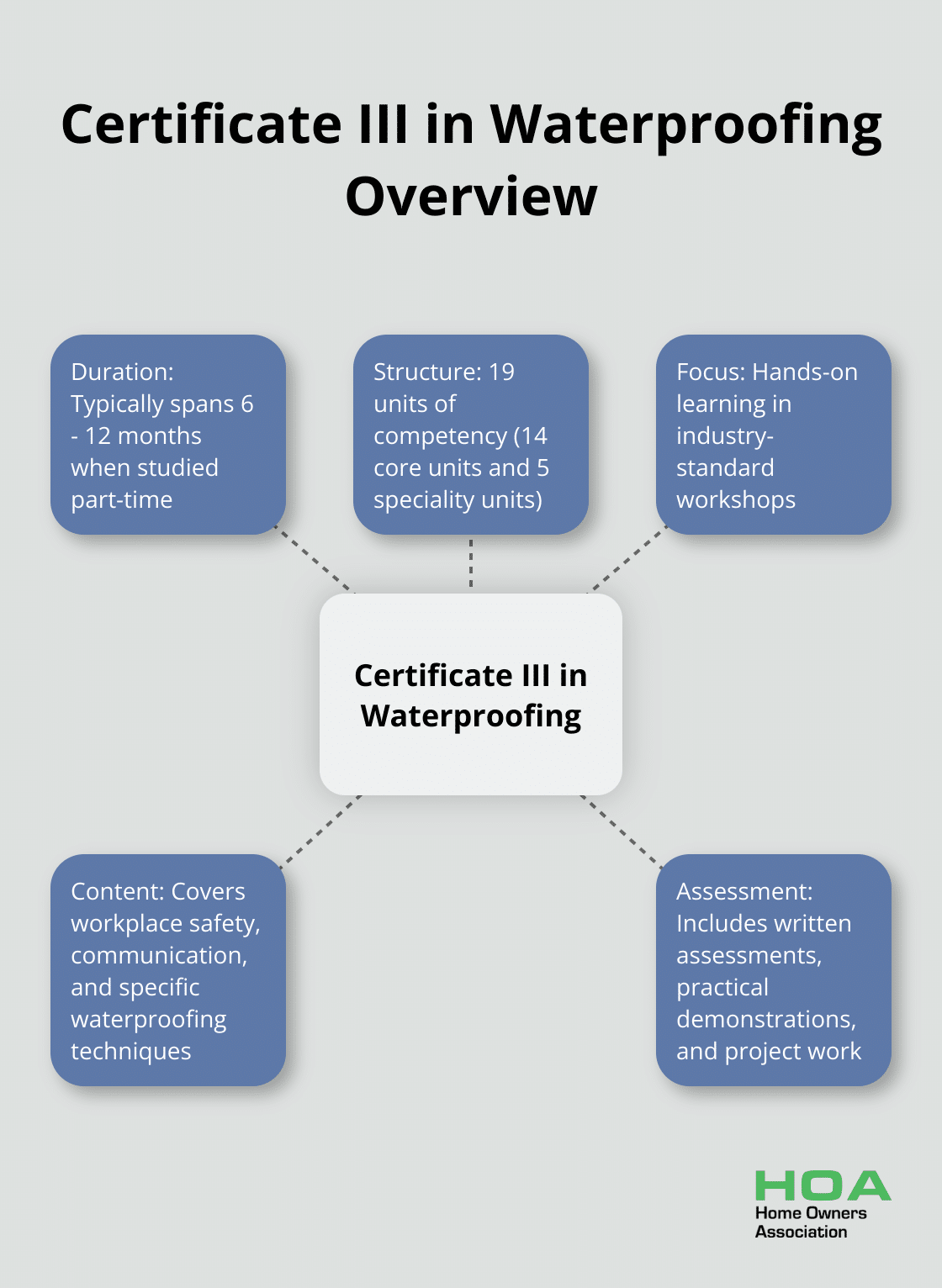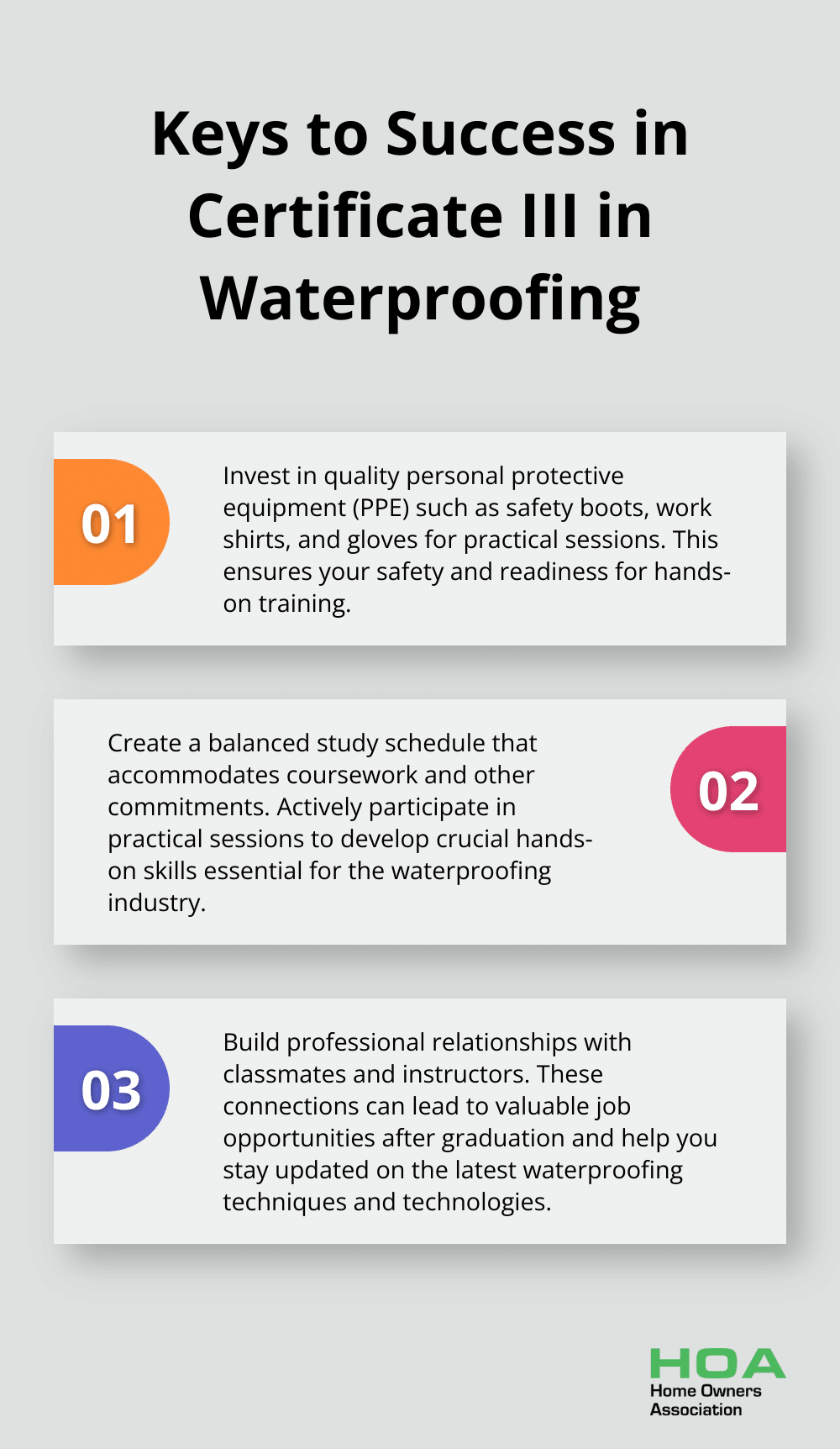
At Home Owners Association, we understand the importance of proper waterproofing in maintaining the integrity of your property.
If you’re considering a career in this field or looking to enhance your skills, obtaining a Certificate III in Waterproofing can be a game-changer.
This comprehensive qualification equips you with the expertise to tackle various waterproofing projects effectively.
In this guide, we’ll walk you through the steps to acquire this valuable certification and set yourself up for success in the waterproofing industry.
What Is the Certificate III in Waterproofing?
Overview of the Qualification
The Certificate III in Waterproofing is a nationally recognised qualification in Australia. It provides individuals with the skills and knowledge to become professional waterproofers. This certification is essential for those who want to work in the construction industry, specifically in waterproofing applications for buildings and structures.
Course Content and Skills
The course covers a wide range of waterproofing techniques and applications. Students learn to:
- Prepare surfaces for waterproofing
- Apply waterproofing to internal and external areas
- Work on various structures (including balconies, decks, and below-ground spaces)
- Use essential tools and equipment (such as trowels, rollers, and heat welds)
A key aspect of this course is its focus on practical skills. Students spend a significant portion of their training in industry-standard workshops, gaining hands-on experience. This practical approach ensures that students develop the actual skills they’ll need on the job, not just theoretical knowledge.
Career Opportunities
With a Certificate III in Waterproofing, individuals position themselves well for a career in the construction industry. Master Builders anticipates that more than half a million new workers are needed in the building and construction industry over the next five years.

Qualified waterproofers can work on residential and commercial construction projects, specialising in areas such as:
- Internal wet areas
- External above-ground spaces
- Below-ground waterproofing
Employment opportunities exist with construction companies, waterproofing specialists, or even starting one’s own waterproofing business.
Licensing and Recognition
Completing this certificate is a key step towards obtaining a waterproofing licence in many Australian states. For example, in New South Wales, this qualification is required to apply for the NSW Fair Trading Waterproofing Licence. However, it’s important to note that additional conditions may apply depending on the state or territory.
The expertise gained through this course ensures that waterproofing work meets the highest standards, protecting properties from water damage and extending their lifespan. This level of expertise is particularly valuable for members of organisations like Home Owners Association (Australia’s top choice for homeowner support since 1980), who are involved in construction or renovation projects.
Now that we’ve explored what the Certificate III in Waterproofing entails, let’s examine the specific requirements and structure of the course.
Course Requirements and Structure for Certificate III in Waterproofing
Entry Requirements
The Certificate III in Waterproofing has specific entry criteria. Applicants must be at least 18 years old. While construction industry experience is advantageous, it’s not always required. Candidates need to demonstrate intermediate fitness levels and good communication skills, which are essential in the waterproofing field.
Before enrolment, a literacy and numeracy assessment takes place. This assessment identifies areas where additional support might be necessary during the course.
Course Structure and Duration
The Certificate III in Waterproofing typically spans 6 – 12 months when studied part-time. This structure accommodates working professionals who need to balance current commitments with their studies. The course consists of 19 units of competency (14 core units and 5 speciality units).

Core units cover fundamental skills such as:
- Workplace health and safety
- Effective communication in construction
- Handling waterproofing materials
Speciality units focus on specific waterproofing techniques for various areas (internal wet spaces, external surfaces, and below-ground structures).
Study Modes and Practical Training
This course emphasises hands-on learning. A substantial portion of the training occurs in industry-standard workshops, where students gain practical experience with tools and techniques used in real-world waterproofing projects.
Some training providers offer flexible study options, including evening and weekend classes. This flexibility benefits those who juggle work and study commitments.
Assessment Methods
The Certificate III in Waterproofing uses various assessment methods to evaluate practical skills and theoretical knowledge. These include:
- Written assessments
- Practical demonstrations
- Project work
For example, students might waterproof a mock-up area, demonstrating their ability to prepare surfaces, apply waterproofing materials, and ensure proper sealing. These hands-on assessments ensure job readiness upon course completion.
The practical nature of this course aligns well with the needs of the construction industry. It equips students with the skills necessary to tackle real-world waterproofing challenges effectively. As you consider your next steps, let’s explore how to enrol and successfully complete your Certificate III in Waterproofing.
How to Enrol and Succeed in Your Certificate III in Waterproofing
Choose the Right Training Provider
Start your journey by researching accredited Registered Training Organisations (RTOs) that offer the Certificate III in Waterproofing. Look for providers with strong industry connections and a history of successful graduates. TAFE institutions are reputable providers, but private RTOs may also offer quality programmes.
Compare course structures, delivery modes, and schedules to find one that suits your needs. Some providers offer evening and weekend classes, which can benefit full-time workers. Check if they provide industry placements or have partnerships with construction companies, as this can enhance your practical experience and job prospects.
Navigate the Application Process
After selecting a training provider, contact them to inquire about their specific application requirements. Typically, you’ll need to:
- Complete an application form
- Provide proof of identity and residency status
- Submit relevant qualifications or work experience documentation
- Complete a literacy and numeracy assessment
Some providers may require you to attend a pre-training interview to assess your suitability for the course. Use this opportunity to ask questions and ensure the programme aligns with your career goals.
Explore Financial Assistance Options
The cost of the Certificate III in Waterproofing can vary, but several financial assistance options exist:
- Government subsidies: Many states offer subsidised training for eligible students.
- Apprenticeships and traineeships: These options allow you to learn while you earn, with employers often covering course fees.
- Payment plans: Some RTOs offer flexible payment options, allowing you to spread the cost over the duration of your course.
- VET Student Loans: If eligible, you may access a government loan to cover your course fees.
Research these options thoroughly and discuss them with your chosen training provider to find the best financial solution for your situation.
Succeed in Your Course

To enrol in a Certificate III in Waterproofing course, you must be at least 18 years old. While formal qualifications aren’t always mandatory, they can be beneficial for your career in waterproofing.
Final Thoughts
A Certificate III in Waterproofing opens doors to a rewarding career in construction. This qualification equips you with essential skills for waterproofing applications, preparing you for real-world challenges. The hands-on training ensures you’re job-ready upon completion, meeting the high demand for qualified waterproofers in the growing construction industry.
We at Home Owners Association recognise the value of quality workmanship in home improvement projects. Our members benefit from access to trade pricing and discounts on construction materials (making waterproofing projects more accessible). Whether you’re a homeowner or a professional, pursuing this certification will enhance your skills and contribute to better construction outcomes.
Take the next step in your career journey by researching accredited training providers and exploring financial assistance options. Home Owners Association offers resources and expert advice to support you throughout your educational journey. Your success in obtaining the Certificate III in Waterproofing will not only benefit you but also contribute to creating safer, more durable buildings for all.





